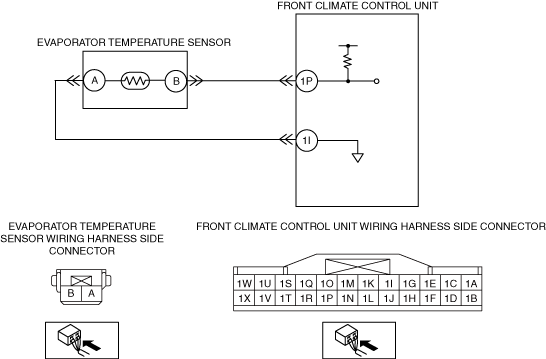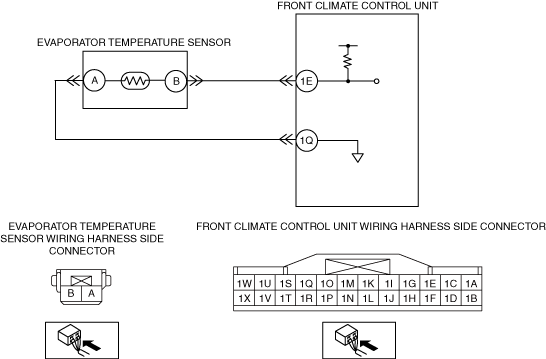Note
• There are two types of front climate control unit, type A and type B.
ac9wzw00005455
|
DTC B1B71:11, B1B71:13 [CLIMATE CONTROL UNIT (FULL-AUTO AIR CONDITIONER)]
id0702k2817100
ac9wzw00005455
|
Front Climate Control Unit Type A
|
System malfunction location |
• B1B71:11: Evaporator temperature sensor circuit short to ground
• B1B71:13: Evaporator temperature sensor circuit open
|
|---|---|
|
Detection condition
|
• Malfunction in wiring harness between evaporator temperature sensor and front climate control unit
|
|
Fail-safe function
|
• A/C output OFF is controlled when the evaporator temperature sensor input value is at 0 °C {32 °F}.
|
|
Possible cause
|
• Connector or terminal malfunction
• Evaporator temperature sensor malfunction
• Open circuit in wiring harness between front climate control unit and evaporator temperature sensor
• Short to ground in wiring harness between front climate control unit and evaporator temperature sensor
• Front climate control unit malfunction
|
 |
|
Diagnostic procedure
|
STEP |
INSPECTION |
ACTION |
|
|---|---|---|---|
|
1
|
INSPECT EVAPORATOR TEMPERATURE SENSOR CONNECTOR
• Switch the ignition off.
• Disconnect the negative battery terminal.
• Disconnect the evaporator temperature sensor connector.
• Inspect the connector and terminals (corrosion, damage, pin disconnection).
• Are the connector and terminals normal?
|
Yes
|
Go to the next step.
|
|
No
|
Repair/replace the connector or terminal.
After repair procedure, go to Step 6.
|
||
|
2
|
INSPECT EVAPORATOR TEMPERATURE SENSOR
• Inspect the evaporator temperature sensor.
• Is it normal?
|
Yes
|
Go to the next step.
|
|
No
|
Replace the evaporator temperature sensor.
Go to Step 6.
|
||
|
3
|
INSPECT EVAPORATOR TEMPERATURE SENSOR CIRCUIT FOR OPEN CIRCUIT
• Disconnect the front climate control unit connector.
• Inspect for continuity between the following terminals (wiring harness-side):
• Is there continuity?
|
Yes
|
Go to the next step.
|
|
No
|
Refer to the wiring diagram and verify whether or not there is a common connector between front climate control unit terminal and evaporator temperature sensor terminal.
If there is a common connector:
• Determine the malfunctioning part by inspecting the common connector and the terminal for corrosion, damage, or pin disconnection, and the common wiring harness for an open circuit.
• Repair or replace the malfunctioning part.
If there is no common connector:
• Repair or replace the wiring harness which has an open circuit.
Go to Step 6.
|
||
|
4
|
INSPECT EVAPORATOR TEMPERATURE SENSOR CIRCUIT FOR SHORT TO GROUND
• Inspect for continuity between the following terminal (wiring harness-side) and body ground:
• Is there continuity?
|
Yes
|
Refer to the wiring diagram and verify whether or not there is a common connector between front climate control unit terminal and evaporator temperature sensor terminal.
If there is a common connector:
• Determine the malfunctioning part by inspecting the common connector and the terminal for corrosion, damage, or pin disconnection, and the common wiring harness for a short to ground.
• Repair or replace the malfunctioning part.
If there is no common connector:
• Repair or replace the wiring harness which has a short to ground.
Go to Step 6.
|
|
No
|
Go to the next step.
|
||
|
5
|
VERIFY FRONT CLIMATE CONTROL UNIT CONNECTOR CONDITION
• Inspect the connector and terminals (corrosion, damage, pin disconnection).
• Are the connector and terminals normal?
|
Yes
|
Go to the next step.
|
|
No
|
Repair/replace the connector or terminal.
After repair procedure, go to the next step.
|
||
|
6
|
VERIFY THAT SAME DTC IS NOT OUTPUT AGAIN
• Reconnect the disconnected connectors.
• Connect the negative battery terminal.
• Clear the DTC from the climate control unit memory using the M-MDS.
• Perform the DTC inspection for the climate control unit using the M-MDS.
• Is the same DTC displayed?
|
Yes
|
Repeat the inspection from Step 1.
• If the malfunction recurs, replace the front climate control unit.
Go to the next step.
|
|
No
|
Go to the next step.
|
||
|
7
|
VERIFY THAT NO OTHER DTCs ARE PRESENT
• Verify other DTCs displayed.
• Are any other DTCs displayed?
|
Yes
|
Repair or replace the malfunctioning part according to the applicable DTC troubleshooting.
|
|
No
|
DTC troubleshooting completed.
|
||
Front Climate Control Unit Type B
|
System malfunction location |
• B1B71:11: Evaporator temperature sensor circuit short to ground
• B1B71:13: Evaporator temperature sensor circuit open
|
|---|---|
|
Detection condition
|
• Malfunction in wiring harness between evaporator temperature sensor and front climate control unit
|
|
Fail-safe function
|
• A/C output OFF is controlled when the evaporator temperature sensor input value is at 0 °C {32 °F}.
|
|
Possible cause
|
• Connector or terminal malfunction
• Evaporator temperature sensor malfunction
• Open circuit in wiring harness between front climate control unit and evaporator temperature sensor
• Short to ground in wiring harness between front climate control unit and evaporator temperature sensor
• Front climate control unit malfunction
|
 |
|
Diagnostic procedure
|
STEP |
INSPECTION |
ACTION |
|
|---|---|---|---|
|
1
|
INSPECT EVAPORATOR TEMPERATURE SENSOR CONNECTOR
• Switch the ignition off.
• Disconnect the negative battery terminal.
• Disconnect the evaporator temperature sensor connector.
• Inspect the connector and terminals (corrosion, damage, pin disconnection).
• Are the connector and terminals normal?
|
Yes
|
Go to the next step.
|
|
No
|
Repair/replace the connector or terminal.
After repair procedure, go to Step 6.
|
||
|
2
|
INSPECT EVAPORATOR TEMPERATURE SENSOR
• Inspect the evaporator temperature sensor.
• Is it normal?
|
Yes
|
Go to the next step.
|
|
No
|
Replace the evaporator temperature sensor.
Go to Step 6.
|
||
|
3
|
INSPECT EVAPORATOR TEMPERATURE SENSOR CIRCUIT FOR OPEN CIRCUIT
• Disconnect the front climate control unit connector.
• Inspect for continuity between the following terminals (wiring harness-side):
• Is there continuity?
|
Yes
|
Go to the next step.
|
|
No
|
Refer to the wiring diagram and verify whether or not there is a common connector between front climate control unit terminal and evaporator temperature sensor terminal.
If there is a common connector:
• Determine the malfunctioning part by inspecting the common connector and the terminal for corrosion, damage, or pin disconnection, and the common wiring harness for an open circuit.
• Repair or replace the malfunctioning part.
If there is no common connector:
• Repair or replace the wiring harness which has an open circuit.
Go to Step 6.
|
||
|
4
|
INSPECT EVAPORATOR TEMPERATURE SENSOR CIRCUIT FOR SHORT TO GROUND
• Inspect for continuity between the following terminal (wiring harness-side) and body ground:
• Is there continuity?
|
Yes
|
Refer to the wiring diagram and verify whether or not there is a common connector between front climate control unit terminal and evaporator temperature sensor terminal.
If there is a common connector:
• Determine the malfunctioning part by inspecting the common connector and the terminal for corrosion, damage, or pin disconnection, and the common wiring harness for a short to ground.
• Repair or replace the malfunctioning part.
If there is no common connector:
• Repair or replace the wiring harness which has a short to ground.
Go to Step 6.
|
|
No
|
Go to the next step.
|
||
|
5
|
VERIFY FRONT CLIMATE CONTROL UNIT CONNECTOR CONDITION
• Inspect the connector and terminals (corrosion, damage, pin disconnection).
• Are the connector and terminals normal?
|
Yes
|
Go to the next step.
|
|
No
|
Repair/replace the connector or terminal.
After repair procedure, go to the next step.
|
||
|
6
|
VERIFY THAT SAME DTC IS NOT OUTPUT AGAIN
• Reconnect the disconnected connectors.
• Connect the negative battery terminal.
• Clear the DTC from the climate control unit memory using the M-MDS.
• Perform the DTC inspection for the climate control unit using the M-MDS.
• Is the same DTC displayed?
|
Yes
|
Repeat the inspection from Step 1.
• If the malfunction recurs, replace the front climate control unit.
Go to the next step.
|
|
No
|
Go to the next step.
|
||
|
7
|
VERIFY THAT NO OTHER DTCs ARE PRESENT
• Verify other DTCs displayed.
• Are any other DTCs displayed?
|
Yes
|
Repair or replace the malfunctioning part according to the applicable DTC troubleshooting.
|
|
No
|
DTC troubleshooting completed.
|
||